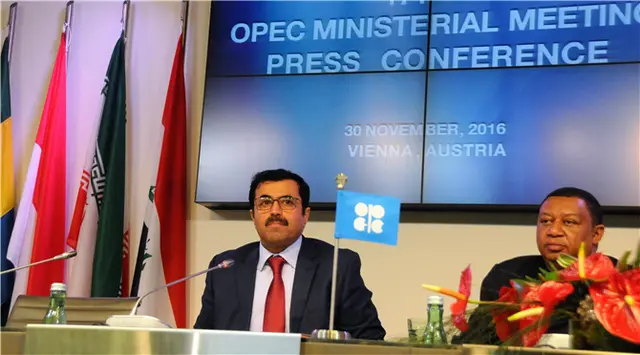The Organization of Petroleum Exporting Countries (OPEC) has reached a deal among all 14 member countries to curtail oil production for the first time since 2008, the oil-producing cartel announced from its headquarters in Vienna on Wednesday.
OPEC ministers confirmed it had secured a cut in its oil production from 33.8 million barrels a day (b/d) to 32.5 million b/d in an effort to prop up prices. Oil prices have fallen by more than half since mid-2014 due to global oversupply and booming U.S. shale production.
Brent crude prices were up over 8 percent as the deal was announced, trading around $50.12 a barrel while WTI was also up over 8 percent and trading at approximately $48.97 a barrel.
From left to right, Mohamed Hamel, chairman of OPEC, Mohammed Al-Sada, Qatar's minister of energy and industry and president of OPEC, Mohammed Barkindo, secretary general of OPEC, and Hasan Hafidh, head of public relations of OPEC, attend a news conference following the 171st Organization of Petroleum Exporting Countries (OPEC) meeting in Vienna, Austria, on Wednesday, Nov. 30, 2016.
Compliance to be monitored
Qatar claimed non-OPEC member Russia was committed to reducing oil production by 300,000 b/d and the 14 member oil exporting countries are poised to meet with non-OPEC producers on December 9.
Kuwait, Venezuela and Algeria all agreed to monitor compliance of the OPEC agreement, according to a Reuters report.
"We're hoping for 600,000 (barrels per day to be cut) from non-OPEC (countries) so that is going to be a substantial volume that will bring health back into the market," Khalid Al Falih, Saudi Arabian minister of energy told CNBC on Wednesday before the meeting.
The cuts to oil production also involved Iraq reducing oil output by 200,000 b/d to around 4.35 million b/d from January 2017.
"As long as US oil production growth remains modest, and OPEC adheres to announced production cuts, the re-balancing of global oil market could be pulled forward into the first half of 2017," Rob Haworth, senior investment strategist at U.S. Bank Wealth Management, said in a note after the OPEC announcement.
OPEC's cuts to production are estimated to erase about 1 percent of global output.
Balancing act
An oil production cut to reduce global oversupply has not been put into action in almost a decade. However, following two consecutive years of low oil prices; the pressure on OPEC to act had intensified.
In September's Algeria meeting, the 14-member cartel outlined a deal which would restrict output and, after being implemented in Vienna, should theoretically lift the economic pain of low oil prices on countries reliant on producing the commodity.
The balancing act for OPEC on Wednesday had been to agree on individual production levels for each country whilst remaining vigilant to non-OPEC exporters looking to seize a greater share of the market.
(CNBC)
 简体中文
简体中文

